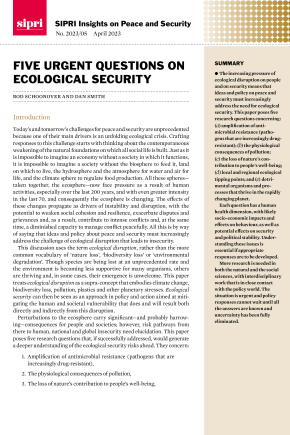Five Urgent Questions on Ecological Security
The increasing pressure of ecological disruption on people and on security means that ideas and policy on peace and security must increasingly address the need for ecological security. This paper poses five research questions concerning: (a) amplification of antimicrobial resistance (pathogens that are increasingly drug-resistant); (b) the physiological consequences of pollution; (c) the loss of nature’s contribution to people’s well-being; (d) local and regional ecological tipping points; and (e) detrimental organisms and processes that thrive in the rapidly changing planet.
Each question has a human health dimension, with likely socio-economic impacts and effects on behaviour, as well as potential effects on security and political stability. Understanding these issues is essential if appropriate responses are to be developed.
More research is needed in both the natural and the social sciences, with interdisciplinary work that is in close contact with the policy world. The situation is urgent and policy responses cannot wait until all the answers are known and uncertainty has been fully eliminated.
Introduction
1. How will antimicrobial resistance be affected by ecological disruption, and with what societal consequences?
2. Do (or will) the physiological effects of pollution have sociological effects and, if so, with what security dimensions?
3. What are the social consequences as nature’s contribution to people’s well-being diminishes?
4. Is there a relationship between ecological tipping points and social change, political instability and consequent insecurity?
5. What consequences arise from detrimental organisms and ecological processes that are strengthened as the ecosphere changes?
Conclusions and recommendations


